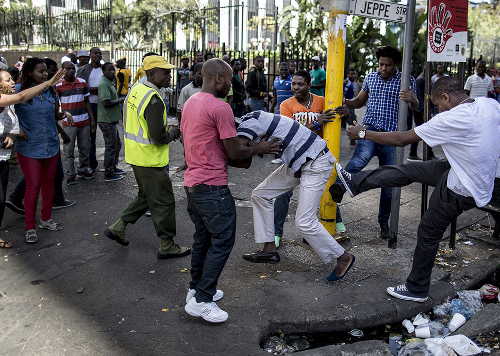 On Tuesday 20 May 2008, ” said one of a group of young men lounging on a main street.
On Tuesday 20 May 2008, ” said one of a group of young men lounging on a main street.
“But they had to go. They do not belong here taking jobs. Let them go back to Zimbabwe and solve their own problems instead of bringing them here. We have enough problems of our own.”
On top of the dead, about 50 people had been taken to hospital with gunshots and stab wounds as ‘the gangs smashed their way in to the dozen or so foreign-owned shops in Cleveland, in the south of Johannesburg’. The foreigners had been accused ‘of taking jobs, houses and women of South African blacks’.
In other townships, at least another 60 people have been killed in such a gruesome manner that two men had their throats cut and others had been ‘burned alive, beaten to death or shot, in the worst violence to hit Johannesburg since the politically-driven killings of the final years of apartheid’.
Following the wanton violence of 2008, the government was criticised for failure to provide jobs and better living conditions for the poor South African blacks while a ruling elite had got very rich – leaving the black South Africans to compete for the limited jobs and housing with immigrants from other African countries.
Run forward to 2015. Over the last one month, the world has witnessed unparalleled xenophobic violence in South Africa that has led to death, destruction, and misplacement of black people.
The shocking violence has been meted against non-South African black peoples by black South Africans. The perpetrators of the heinous xenophobic attacks blame their unemployment and poverty on foreign black Africans whom they accuse of taking jobs that ‘belong’ to the black South Africans. Just like it was in 2008.
So why hasn’t the government bothered to address the issues that the black south Africans have been complaining about since the end of Apartheid – a policy that had for years led to deliberate discrimination and dehumanization of the black people by the white minority. Jean Pierre Misago, a researcher at the African Centre for Migration and Society at the University of Witwatersrand, has said: ‘It didn’t start or end in 2008. It had been building up’.
He writes that in 1998, three foreign-nationals were killed, on a train, between Johannesburg and Pretoria. He wrote that in 2000, a Sudanese refugee was thrown from a moving train on a similar route. And that the reasons were all the same: blaming foreigners for a lack of jobs, or economic opportunity.
Twenty years on, the majority of South Africans continue to live on the margins, protesting everyday against poor service delivery, low levels of development or improvement in quality of their lives. It is with this realization that there is constant warning that unless government that addresses the desperate levels of inequality, hopelessness and anger will continue leading to resentment of government and violence against ‘soft targets’.
Social scientists have warned the attacks on foreigners do not happen in a vacuum, nor can they be explained away simply by hatred of all things foreign.
Seeing the inequality in South Africa or in Uganda is not rocket science. Equally so, history is replete with evidence of hopelessness has historically led some people to destroy their own lives or the lives of others.
When some black South Africans were shown on international television accusing their ‘black’ government of betraying black people and some saying they at least had jobs under Apartheid, one could not fail to be reminded of a placard carried by a rioting woman from Amuru district, reading, ‘Kony hurry up and save us’.
This obviously does not mean these women like Kony especially knowing the pain he caused to the people of northern Uganda, but it goes to show how far a desperate, hopeless mind can go.







